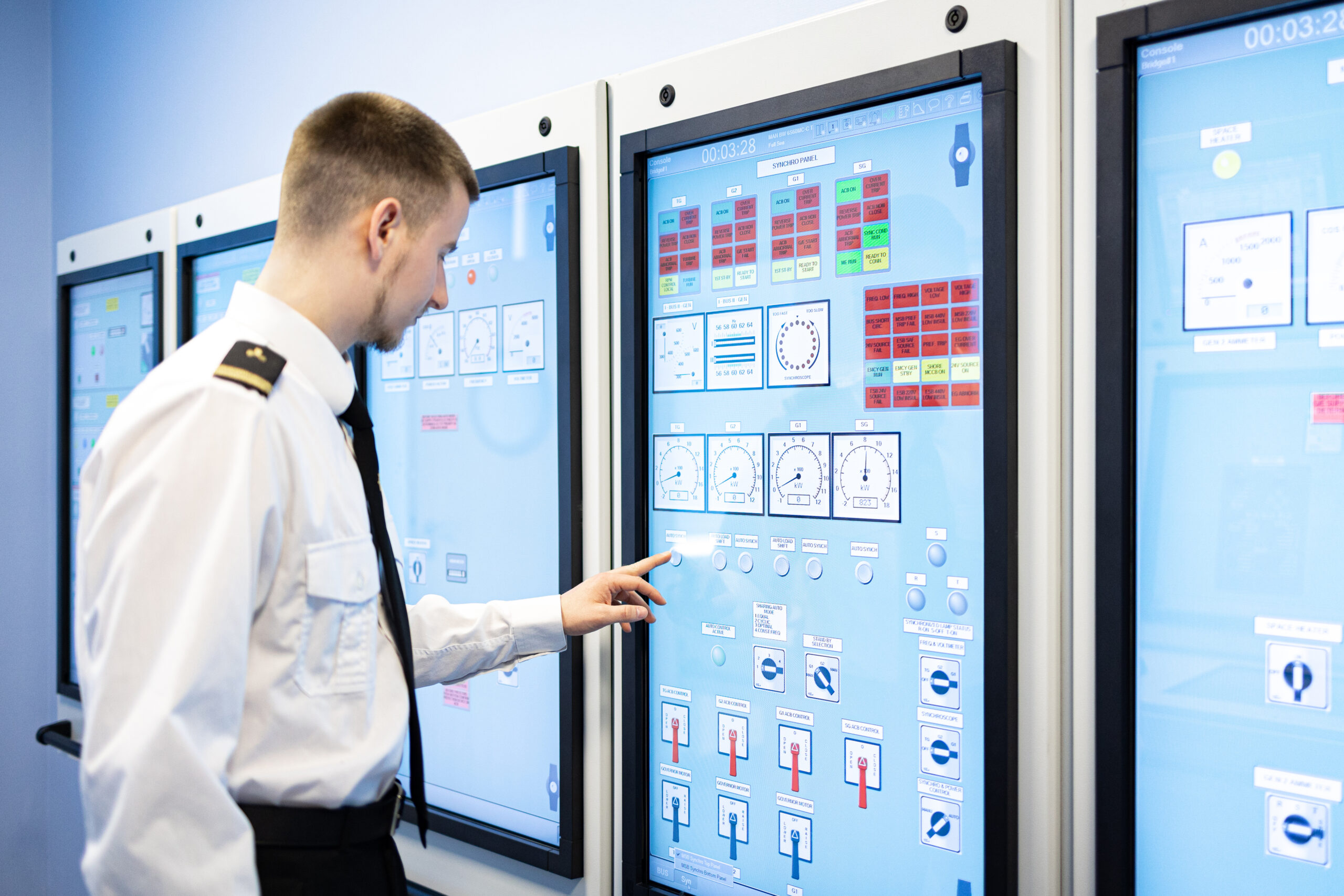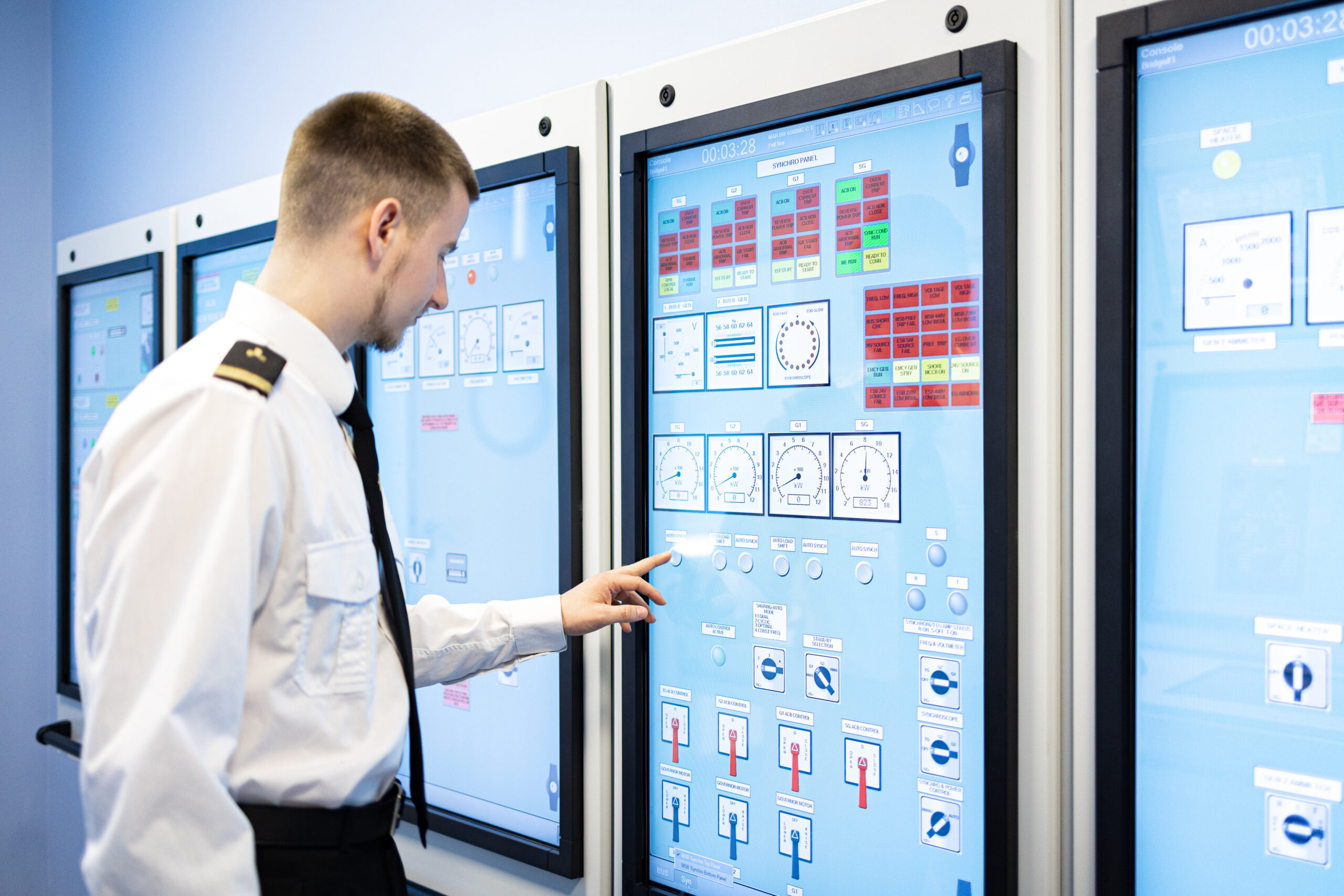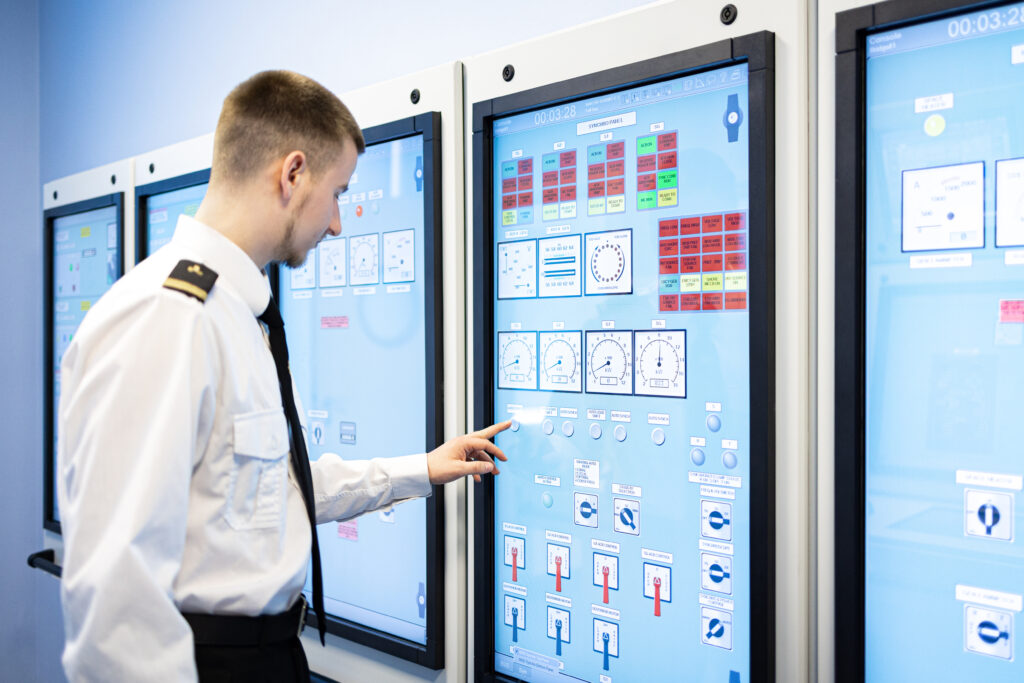
FOR MORE INFORMATION
Room 219
Phone: +370 46 397 246
Mobile Phone: +370 650 25 985
Department of Marine Engineering dr. Valdas Lukauskas
E-mail: valdas.lukauskas@vilniustech.lt
Room 219
Phone: +370 46 397 246
Mobile Phone: +370 650 25 985
Administrator Jūratė Zajauskienė
E-mail: jurate.zajauskiene@vilniustech.lt
a
Technological innovations in maritime transport are among the most modern in the global transport system, and this study programme is designed to train Officer in Charge of a Engine Watch who will ensure the successful operation and maintenance of modern ship engines and other energy equipment of various power.
STUDY PROGRAMME SPECIALIZATIONS
Operation of ships’ energy equipment
The study programme of the university of applied sciences in the field of maritime engineering meets the STCW standards of the International Maritime Organization Convention and is the only one in the country where one obtains a higher education of the university of applied sciences and professional qualification upon completion, giving the right to obtain a maritime degree diploma of ship mechanic on duty issued by the Maritime Department of the Lithuanian Transport Safety Administration.
Repairs of ships and ships’ energy equipment
Graduates of the specialization acquire the competence of a highly qualified ship repair specialist, which provides an opportunity for employment in shipbuilding, repairs, and related industries in the country and abroad.
More information in the system AIKOS
(Full-time studies)
(Part-time studies) in Lithuanian language only
Duration of internship
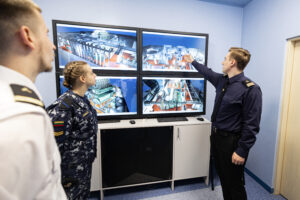

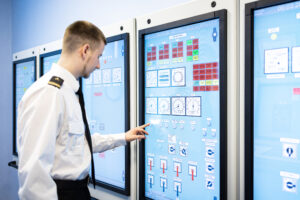
The lecturers are researchers and scientists in the field of marine technology, and professional seafarers who base their knowledge on personal experience at sea.
CAREER
After obtaining the maritime degree diploma of a ship mechanic on duty, a graduate can hold the position of the third mechanic of the ship’s engine room while working on seagoing ships; after accumulating the seagoing experience determined by the Ministry of Communication of the Republic of Lithuania, the graduate can take the position of the second mechanic of the ship, and then the position of the chief mechanic on ships with unlimited engine power of various purposes. After completing the professional career of a seafarer, it is possible to work in shipbuilding and repair companies, as well as in the Maritime Department of the Lithuanian Transport Safety Administration, the Klaipėda State Seaport Authority, the industry of inland water transport, etc. During the course of studies, students are given the opportunity to acquire the qualification of boat motorist.
If the Junior Officer Command Training is chosen in parallel, the student will be provided with an opportunity to acquire one more (officer’s) profession and obtain the rank of reserve lieutenant and perform mandatory initial military service in a part-time manner (after completing the course, 9-month initial mandatory military service is credited). Students will be given the opportunity to apply for service in the Lithuanian Armed Forces and pursue an officer’s career.
THE AIM OF THE STUDY PROGRAMME
Prepare highly qualified maritime engineer – the ship crew’s leading specialist of the ship’s engine room, a ship mechanic or a ship and ship’s energy equipment repair engineer, regulated by the conventions of the International Maritime Organization, capable of:
– applying knowledge of marine engineering, technology, natural and other sciences;
– Safely operating or repair power plants, auxiliary mechanisms, refrigeration units of ships of unlimited power;
– Leading the ship’s engine room or repair team, operating in accordance with the conventions of the International Maritime Organization, the requirements of safe shipping, ship and equipment classification societies, and quality standards.
INTERNSHIP
Duration of professional internship is 12 months. Of which: 4-month shore internship and 8-month seafaring internship. A seaman’s degree is awarded and a seaman’s degree diploma is issued upon fulfillment of all internship requirements.
SHORE INTERNSHIP
– Training internship of locksmithing and repairs in the LMA workshop (1st year);
– Internship of technical maintenance and repairs of ships’ electrical equipment completed in shipbuilding and repair companies (during 2nd year)
SEAFARING INTERNSHIP
Seafaring internship is carried out in international crews on various ships of the world and in various sailing regions.
– 4-month professional seafaring internship (after the 2nd year);
– 4-month graduation seafaring internship (after the 3rd year)
The minimum duration of seafaring internship at sea is 6 months.
The remaining 2 months of seafaring internship can be completed ashore.
The minimum duration of seafaring internship for qualification acquisition is 4 months.
However, graduates who want to work on ships are required to complete 6-month seafaring internship. During their studies, students have the opportunity to complete a 6-month seafaring practice, so that after graduation, they will not only acquire the professional qualification of a ship’s electrical engineering mechanic, but can also start working on a ship as an electrical engineering mechanic-engineer.
If a student has completed only 4 months of seafaring practice during their studies, but wishes to start working as an electrical engineering mechanic, they are given the opportunity to go on a 2- month internship within 1 year of graduation. The trainees of the Junior Officer Command Training (JOCT) perform a 2-month internship on the military ships of the Lithuanian Armed Forces. This is incorporated as part of the seafaring internship and counts towards the total duration of the seafaring internship.
ENVIRONMENT OF STUDIES
Studies take place in a modern environment that meets international requirements. There are traditional engaging lectures, seminars, discussions, analysis of scientific and professional literature, and students have access to a modern library filled with the latest scientific and informational publications, along with an internal digital teaching/learning environment and digital resources of the academy.
During lectures, exercises, and seminars, analysis of modern ship management scenarios and cases is carried out, technological solutions to ship management problems are sought, and computer simulation of the ship’s voyage is performed. Computerized training is extremely relevant during the studies, so training of practical skills takes place in electronic navigation simulators, simulating real scenarios of ship control.
Students of LMA maritime studies are required to wear uniforms.
LMA is equipped with sports halls and gyms, which are intended for optional sports, physical education classes, sports competitions, sports and other events in which students of all study programmes participate. They can also spend their free time in these facilities.
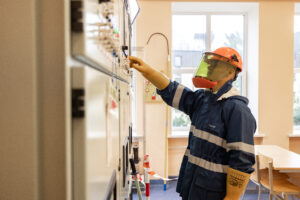
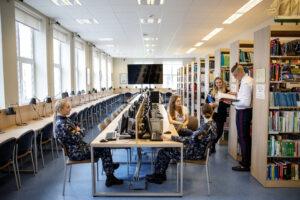
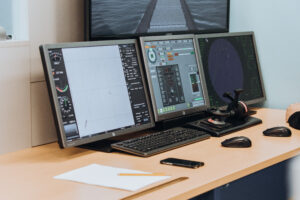
SUBJECTS OF STUDY PROGRAMME
| 1st SEMESTER | CREDITS (ECTS) |
|---|---|
| Applied Mathematics | 4 |
| Fundamentals engineering science | 4 |
| IT | 4 |
| Materials Engineering | 3 |
| Thermodynamics | 5 |
| Material Processing and Repair Works Workshop | 6 |
| Seamanship basics/ Geography of transport systems (Optional study subject) | 4 |
| Physical education/ Rowing and sailing (Facultative) | 2 |
| Lithuanian language and culture (Facultative) | 1 |
| 2nd SEMESTER | CREDITS (ECTS) |
|---|---|
| Introduction to Maritime English | 3 |
| Philosophy and Ethics / Sociology / Fundamentals of Political Science / European Culture / Management Psychology / Intercultural Communication / Development of Seaports and Shipping | 2 |
| Material Processing and Repair Works Workshop | 6 |
| Applied Chemistry | 3 |
| Electrical Engineering and Electrical Measurement | 6 |
| Mathematical Basics of Engineering | 3 |
| Engineering and Computer Graphics | 4 |
| Specialization: Repair of ships and ship’s propulsion power plants. Personal Survival Techniques, Fire Prevention and Fire Fighting, Elementary First Aid, Personal Safety and Social Responsibilities training programme (Basic Safety Training, STCW A VI/1), Security Training for Seafarers with Designated Security Duties training course programme (STCW A-VI/6-2) | 3 |
| Specialization: Operation of ship power equipment. Personal Survival Techniques, Fire Prevention and Fire Fighting, Elementary First Aid, Personal Safety and Social Responsibilities training programme (Basic Safety Training, STCW A VI/1), Security Training for Seafarers with Designated Security Duties training course programme (STCW A-VI/6-2) | 3 |
| Physical education/ Rowing and sailing (Facultative) | 1 |
| Lithuanian language and culture (Facultative) | 1 |
| 3rd SEMESTER | CREDITS (ECTS) |
|---|---|
| Maritime English – Ship propulsion terminology and language practice | 3 |
| Ship‘s Auxiliary Machinery | 5 |
| Construction of Marine Internal Combustion Engines | 5 |
| Labor Safety, Civil Protection and Marine Environment | 5 |
| Specialization: Repair of ships and ship’s propulsion power plants. Ships Hull Construction and Welding Engineering | 4 |
| Specialization: Repair of ships and ship’s propulsion power plants. Ship‘s Propulsion Power Plants Repairing Technologies | 5 |
| Specialization: Repair of ships and ship’s propulsion power plants. Ship Hull’s 3D modeling | 3 |
| Professional Practice of Ships Propulsion Machinery and Repair in Shipbuilding and Repair Yards/ Professional Practice of Ships Propulsion Machinery and Repair on seagoing ships/ Professional Practice of Ships Propulsion Machinery and Repair on warships/ (Optional study subject) | 12 |
| Lithuanian language and culture (Facultative) | 1 |
| 4th SEMESTER | CREDITS (ECTS) |
|---|---|
| Maritime English – Ship Auxiliaries terminology and language practice | 5 |
| Technical Mechanics | 4 |
| Ship‘s Machinery Maintenance and Repairs | 4 |
| Professional Language Culture | 3 |
| Engineering Research Methodology | 3 |
| Marine Engineering Project Management | 4 |
| Specialization: Repair of ships and ship’s propulsion power plants. Final Professional Practice of Ships Hull Repair / Final Professional Practice of Ships Propulsion Machinery and Repair (Optional study subject) | 7 |
| Specialization: Operation of ship power equipment. Advanced Fire Fighting training programme (STCW A-VI/3); Medical First Aid & Medical Care traning programme (STCW A-VI/4) | 3 |
| Professional practice on seagoing ships/ Professional practice on coastal sailing ships/ Professional practice on warships (Optional study subject) | 4 |
| Lithuanian language and culture (Facultative) | 1 |
| 5th SEMESTER | CREDITS (ECTS) |
|---|---|
| Specialization: Operation of ship power equipment. Maritime English – Ship electrical and control systems, standby and safety terminology, language and writing practice | 4 |
| Specialization: Repair of ships and ship’s propulsion power plants. Maritime English – Ship construction terminology | 4 |
| Hydraulics | 3 |
| Ship‘s Refrigeration Plants | 3 |
| Specialization: Repair of ships and ship’s propulsion power plants. Professional Bachelor Diploma Thesis | 3 |
| Specialization: Repair of ships and ship’s propulsion power plants. Final Professional Practice of Ships Hull Repair / Final Professional Practice of Ships Propulsion Machinery and Repair (Optional study subject) | 17 |
| Professional practice on seagoing ships/ Professional practice on coastal sailing ships/ Professional practice on warships (Optional study subject) | 20 |
| Lithuanian language and culture (Facultative) | 1 |
| 6th SEMESTER | CREDITS (ECTS) |
|---|---|
| Ship‘s Theory | 4 |
| Design of Machine Parts | 5 |
| Theory of Marine Internal Combustion Engines | 5 |
| Marine Steam and Gas Turbine Plants | 6 |
| Management of Ship Propulsion Equipment | 4 |
| Specialization: Repair of ships and ship’s propulsion power plants. Professional Bachelor Diploma Thesis | 6 |
| Specialization: Operation of ship power equipment. Chemotology (Optional study subject) | 3 |
| Final Professional Sea-going practice / Final Professional Coastal sailing Practice/Final Professional practice on warships (Optional study subject) | 3 |
| 7th SEMESTER | CREDITS (ECTS) |
|---|---|
| Specialization: Operation of ship power equipment. Ship‘s Electronics and Automation (Optional study subject) | 5 |
| Specialization: Operation of ship power equipment. Ship‘s Power Equipment and Maintenance (Optional study subject) | 4 |
| Final Professional Sea-going practice / Final Professional Coastal sailing Practice/Final Professional practice on warships (Optional study subject) | 21 |
| 8th SEMESTER | CREDITS (ECTS) |
|---|---|
| Specialization: Operation of ship power equipment. Ship‘s Electrical Machinery (Optional study subject) | 5 |
| Specialization: Operation of ship power equipment. Ship‘s Automation Systems (Optional study subject) | 3 |
| Specialization: Operation of ship power equipment. Maritime Law (Optional study subject) | 3 |
| Specialization: Operation of ship power equipment. Proficiency in Survival Craft and Rescue Boats other than Fast Rescue Boats training programme (STCW A-VI/2-1) (Optional study subject) | 2 |
| Specialization: Operation of ship power equipment. Engine Room Electronic Simulator and Engine Room Resource Management (STCW, A-III/1-3, A-III/6, A-VIII/2) (Optional study subject) | 6 |
| Specialization: Operation of ship power equipment. Final Qualification Examination (Optional study subject) | 2 |
| Specialization: Operation of ship power equipment. Professional Bachelor Diploma Thesis (Optional study subject) | 9 |



